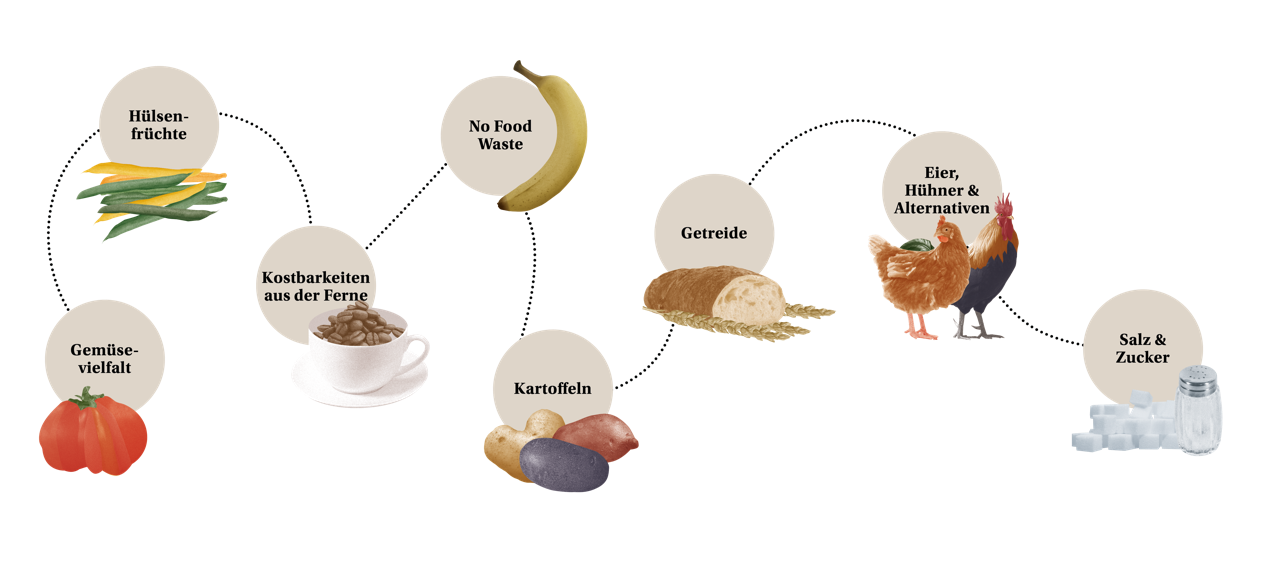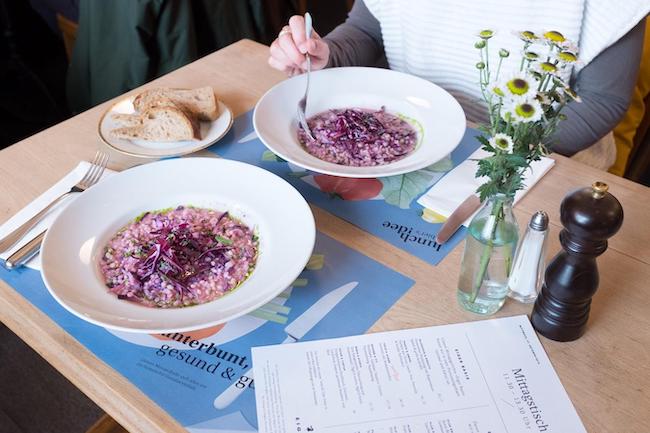The potential in gastronomy is huge
Guest entry from : lunchidee - Sophie Frei
© image 1: Simon Tanner
© image 2: James Batten
Nutritionist Sophie Frei of freistil is committed through her pioneering project lunchidee to a sustainable food culture and gastronomy. She is convinced that our daily choices can make a huge difference based on the belief that what we eat and drink not only affects us and our health, but also the environment, society and the economy – now and in the future, locally and globally.
Potential for a sustainable food culture
Gastronomy offers huge potential to promote a sustainable food culture in a positive, tangible way. Under normal circumstances, some 70% of the Swiss population eat out at lunchtime alone. “We have an opportunity here to reach a lot of people and trigger something in guests using food and drink-centred information, stories and sensory experiences. More and more guests want to know what they are eating, where the ingredients come from and how they are produced. Many want attractive vegetarian and vegan options. Refined plant-based dishes are set to become increasingly important in the future,” states the initiator of this pioneering project.
Restaurateurs play an important role as disseminators. They deal with food on a daily basis, work at the interface between field and plate, determine who and what kind of agriculture they support with their purchases, choose how they cooperate with producers, decide how appreciatively they treat food and select what they serve and communicate to their guests. There are numerous fields of action which restaurateurs can actively work in to promote a more sustainable gastronomy. The objective of the lunchidee pilot project was to make these fields of action known to both restaurateurs and guests, and to promote sustainable, healthy cooking and eating habits in an inspirational way using concrete topics and ideas as a basis. Whether it was the neighbourhood pub or the country inn in urban and rural areas of German- and French-speaking Switzerland, the project concentrated exclusively on the lunchtime offer of privately-run gastronomic establishments.
lunchidee aims to whet appetites, inform and inspire conscious action in everyday life.
A total of 35 Restaurants participated in the pilot project. Courageous restaurateurs agreed to join us on a 6- or 8-month journey (2 pilot phases) creating and serving new menus while exploring a new topic each month. The list of 8 topics included, for example, diversity and the discovery of various native varieties of grain, pulse, potato and vegetable. It not only drew attention to animal and vegetable protein suppliers and everyday treasures from afar like coffee and chocolate, but also brought aspects of health into focus by exploring such issues as salt, sugar and fat consumption, as well as instructed on how to compose well-balanced menus. The appreciation of foodstuffs and the avoidance of food waste were important aspects of every topic.

The training materials for restaurateurs were tested and validated during two pilot phases in 35 restaurants in German- and French-speaking Switzerland before being compiled into a practical guide.
"We want our topics, ideas and inspirations to arouse curiosity and encourage restaurateurs to think outside the box, question familiar processes, try out new things and initiate change. This requires courage, openness and a willingness to leave the comfort zone," says the project manager.
As the evaluation report shows, three quarters of the participating businesses were encouraged by the pilot project to make changes, particularly with regard to increasing the attractiveness of vegetarian menus, using native grain varieties, adhering more strictly to regional seasonality, forging new supplier relationships and introducing measures to avoid and reduce food waste. In total, over 25,000 lunchidee menus were sold during the 2nd pilot phase alone. The report also revealed that the kitchen is the principal place for change. A motivated head chef is an essential key person. But the service staff also play a crucial role because despite the colourful, attractive design of lunchidee table sets and flyers, it is difficult – mainly due to time constraints – to reach a large proportion of lunchtime guests.

Made possible by the Migros Pioneer Fund , the pioneering lunchidee project was successfully implemented between 2017 and 2020. It impacted at various levels and largely achieved its goals. However, it also highlighted how challenging it is to initiate and anchor sustainable changes while effectively communicating corresponding messages to guests in an industry where established processes, a hectic daily routine, time constraints and great economic pressure are the norm. In order to encourage a company and its employees to address the issue of a sustainable and healthy eating culture, to question familiar routines and to exit the comfort zone, it is useful to work at several levels simultaneously. It is not a question of whether a 'top down' or a 'bottom up' approach is the right way to go – it is a question of both: the management must back its decision in a committed and motivating manner within the company and create good framework conditions; the staff must be enthusiastic.
The second pilot phase ended abruptly in March 2020 due to the lockdown. Since then, the restaurant industry has been hit hard by the pandemic. At the same time, however, there has been an increase in the number of people and gastronomic establishments showing an interest in a sustainable food culture and committing to diversity, quality, appreciation and conscious enjoyment. They have also realised that this interest and commitment really pays off because the more tangible and authentic the commitment, the more fulfilling and joyful day to day work is in the kitchen, in service and at management level – and the more satisfied the guests are.
A huge thank you to Sophie and lunchidee!


